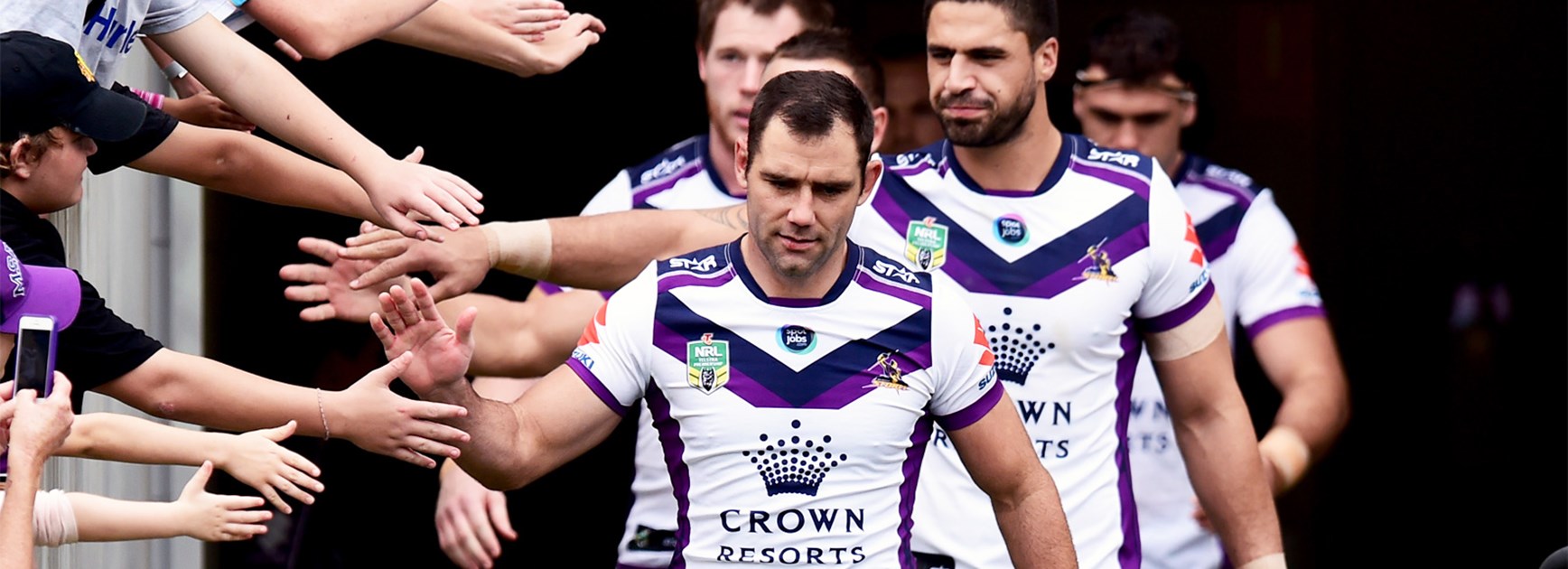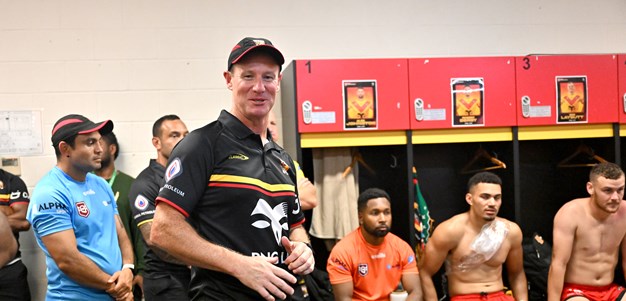
It's the type of business decision made at NRL clubs on an annual basis.
Sometimes the club's big wigs get them wrong; on other occasions they can get them oh so right.
Midway through the 2002 season the Melbourne Storm hierarchy of John Ribot, Chris Johns and coach Mark Murray were engaged in contract negotiations that threatened to tear the club apart while it was still trying to establish a foothold in AFL heartland.
On the one hand they had the club's reigning player of the year and extremely popular clubman Richard Swain seeking a significant upgrade on his next contract; on the other they had a 19-year-old with two NRL games at halfback to his name called Cameron Smith.
Spotted by now Panthers coach Anthony Griffin at a state carnival in Rockhampton where he missed selection in the Queensland under-17s team, Smith signed on with the Storm for $5,000 and spent two seasons learning his craft as a hooker for feeder club Norths Devils in Brisbane but was ready for the next step.
The club had originally hoped to re-sign both Swain and Smith as a way of succession planning but as the negotiations with both parties dragged on it became increasingly clear that was not going to be possible.
Swain and his management wanted a price hike which the club agreed he was worth but was not in a position to pay; Smith simply wanted to play first grade.
For the fifth time in his 15-year career Smith will lead the Melbourne Storm into a Telstra Premiership Grand Final on Sunday but he came perilously close to spending a life in lime green as a Canberra Raider.
"Richard wanted to stay with us but it got to the stage where the money was a big ask so we were really getting pressure from Smithy's manager because at the time Canberra were showing a lot of interest in him," Storm's then executive director John Ribot told NRL.com.
"We had to make a decision. It was a meeting of the minds at the club with all our recruitment people to say, 'This is where we are now, where do we want to be in three years' time?'
"One thing that came back was that Cam was going to be something special. All the recruitment guys said that we were going to be better placed there but you have the emotion of Richard Swain being one of our favourite sons.
"I remember we played the preliminary final against Parramatta [in 1999] and we were down at half-time. He came back and copped a heavy knock and was concussed but scored a try and afterwards didn't realise he'd even scored the try.
"That try basically gave us the win that got the club to play in the grand final and, like Smithy, Richard was a guy everyone wanted to play with.
"And then Cam came along and you make that decision and it was proved right, and even Richard would admit that now."
Mark Murray was the man who handed Smith his NRL debut in Round 5, 2002, using the "best talent" left in the club to serve as a stopgap in the halves when Matt Orford was struggling with a quad tear and back-up Marty Turner was hospitalised after a car accident.
"It was probably a little bit premature for him at the time and a little unfair to play him out of position but that was the faith we had in him," Murray said.
"We were fairly confident of Cameron's potential. No one could predict that he would have the stellar career that he's had but we did believe he was an NRL player and a possible representative player in the making.
"Cameron's agent said he wasn't going to stay if Richard signed so it was a very tough call at the time because Richard was not only a terrific player but a great bloke with it.
"In the end we were forced to make a judgement call which wasn't that popular at the time on Cameron and unfortunately let Richard go."
Of course, Smith was just one of a triumvirate of judicious signings at that time with Billy Slater and Cooper Cronk also carrying out their apprenticeships at Norths before going on to forge incredible careers in Melbourne.
Combined, the trio have now played more than 900 games for the Storm and forever changed the influence rugby league has in the Victorian capital.
"It would be safe to say I don't think we would have won the premierships the way we've won them and been so competitive," Ribot said if they had made a different decision 14 years ago.
"To have those pillars there in those positions of the spine to come through – Billy and Cam born on the same day – it's crazy stuff.
"The biggest thing with Cam was that he had time. If I use an extreme case like Donald Bradman, he just had more time to do everything.
"All the great players can buy time and at a very young age he was just so mature.
"He's just old school. He understands. He's like, wind the clock back.
"He can read a game, he can make a game go fast, he can make a game go slow, he just orchestrates the game and more often than not orchestrates the outcome."
As for Murray, he said not even handing Smith the No.18 jersey that just so happened to represent his age when he made his NRL debut elicited even an inkling of nervous energy.
"Have you ever seen Cam Smith nervous? I haven't either," said Murray.
"Regardless of what was happening in the game and what the defence was doing and what pressure they were trying to apply [Smith and Cronk] never actually panicked or felt that pressure.
"They had calmness and composure about their footy from when they were kids and that's a good quality to have.
"From the first day I saw him play he's never had a bad game. He's had good games and better games, but he's never had a bad game and that's the sort of guy he is."

